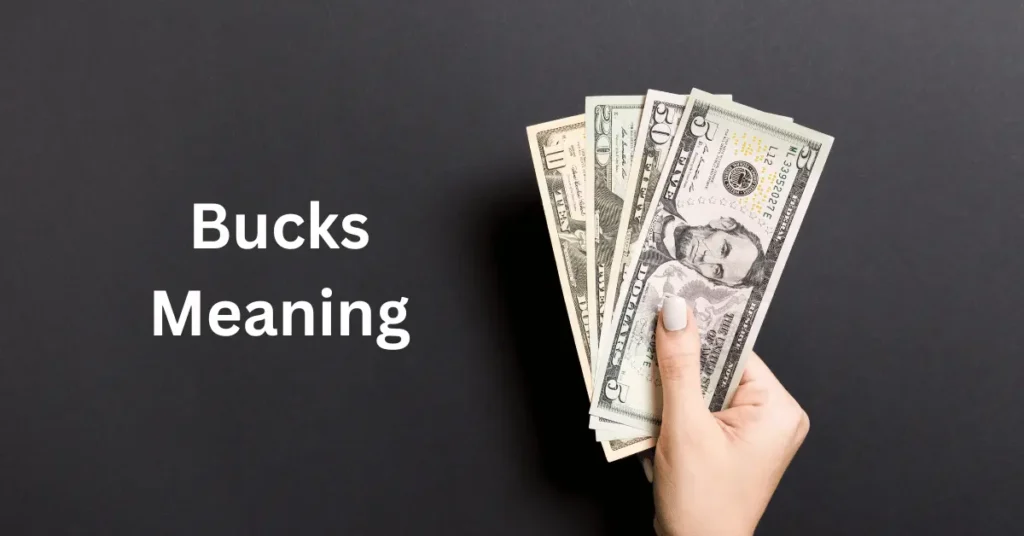Bucks Meaning

If you’ve ever heard someone say, “It costs 10 bucks,” you’ve probably wondered what they meant by “bucks.” Well, “bucks meaning” is actually pretty simple!
It’s just an informal way of referring to the US dollar.
Whether you’re talking about a single dollar or a few bucks, this term is widely used in casual conversations, and you’ve likely heard it countless times.
But where did it come from, and why do we use it? Let’s dive in and explore the meaning of “bucks” in more detail!
What Does “Bucks” Mean?
The term bucks is an informal and casual way to refer to the US dollar. It’s commonly used in everyday conversations when talking about money.
So, if someone says, “I need five bucks,” they’re simply asking for five US dollars.
But “bucks” doesn’t just refer to the dollar in a literal sense. It can also be used more loosely to talk about any amount of money.
For example, someone might say, “That item costs a few bucks,” meaning it’s not necessarily an exact number of dollars but a small amount of money.
The term “buck” is so widely recognized that it’s often used in place of saying “dollar” in both casual and sometimes even in more serious discussions about money.
Another interesting thing about the meaning of “bucks” is that it can also refer to the exchange rate or value of the US dollar when compared to other currencies.
For instance, if someone says, “The euro is stronger than the buck today,” they’re referring to the value of the euro in relation to the US dollar.
So, whether you’re talking about how much something costs, how much you have, or the strength of the US dollar compared to other currencies, “bucks” is a simple, informal term that is easy to understand and use in conversation.
Definition of “Bucks”
“Bucks” is an informal term used to refer to the US dollar, either as a single unit of currency or as a general sum of money.
The term is often used in casual conversations or in situations where a more relaxed tone is appropriate.
It’s a versatile slang that can describe any amount of money in US dollars, and it can even be used to refer to the exchange rate or relative value of the dollar compared to other currencies.
Examples of “Bucks” Meaning
Referring to a Specific Amount of Money (US Dollars)
Example 1: “That car costs 20,000 bucks.”
Here, “bucks” is used to mean 20,000 US dollars. It’s a casual way of talking about a specific amount of money.
Example 2: “I’ll give you five bucks for that book.”
In this example, “bucks” refers to the price of the book in US dollars. The speaker is offering to pay five dollars for it.
Referring to a General Amount of Money
Example 3: “Can I borrow a couple of bucks?”
In this case, “bucks” is used loosely to refer to a small amount of money, though not an exact figure. The person is asking for a small sum, but it doesn’t necessarily specify the exact amount.
Example 4: “I only have a few bucks left in my wallet.”
Here, “bucks” is used to indicate a small amount of money remaining. It’s more of a general reference to money rather than a precise number.
Referring to the US Dollar in Terms of Exchange Rates
Example 5: “The euro is worth more than the buck today.”
In this instance, “the buck” is a casual way of referring to the US dollar. The sentence is discussing the value of the euro in comparison to the US dollar, where the euro is stronger or more valuable.
Example 6: “A dollar has weakened against the buck in recent months.”
Here, “the buck” refers to the US dollar in a broader financial context. The sentence refers to the relative strength of the dollar compared to another currency.
In all these examples, “bucks” serves as an informal and widely understood way to talk about money, making it easier to communicate casually about financial matters.
Whether it’s the exact price of something, a rough amount, or even the strength of the dollar in global markets, “bucks” has become a popular term that everyone can relate to when it comes to money.
Word Origin of “Bucks”

The term “bucks,” when used to refer to money, has an interesting and historical origin that dates back to the early days of American history.
To understand how this slang term for money came to be, we have to look back at the fur trade during the 18th and early 19th centuries.
The Fur Trade and Beaver Pelts
The word “buck” originally referred to the male deer, and more specifically, it came to be associated with the hides of deer and other animals used in the fur trade.
During the colonial era, fur was a vital commodity in the American economy, and animal pelts—particularly those of beavers—were highly sought after and used as a form of currency in trade.
The term “buck” was used to describe these pelts because they were commonly traded, and their value was significant in the marketplace.
In the fur trade, the beaver pelt became a standard unit of exchange. Traders and indigenous people would often trade goods using beaver pelts as a kind of currency.
This was especially common in the northeastern United States and parts of Canada.
Since male deer (often called bucks) were the most frequently hunted for their pelts, the term “buck” became associated with the value of these skins in trade.
Transition from Animal Pelts to Money
As the fur trade grew and expanded, the use of beaver pelts as a unit of trade and currency became so common that “buck” started to be used more broadly to refer to money in general.
By the early 19th century, people began using the term “buck” to refer to the US dollar, which was increasingly used as a standard form of currency.
Over time, the slang for “buck” shifted from a specific reference to the value of animal pelts to a more generalized term for money, especially the US dollar.
By the 19th century, “buck” had become a widely recognized informal term for money, both in everyday conversation and in more formal contexts related to economics.
Spread and Popularization
By the mid-1800s, the term “buck” had become firmly entrenched in American English as a casual way to refer to the US dollar.
Its usage spread across the country as the United States began to become more economically and culturally unified.
Even as the fur trade began to decline, the term remained in popular use, evolving to become synonymous with money in general.
Interestingly, the term “buck” not only survived the decline of the fur trade but also became an enduring part of American slang, still widely used today in both casual conversation and even financial contexts.
Its continued use reflects the deep cultural roots the word developed in the early history of the United States.
The word “buck” as a term for money traces its origins back to the 18th century and the fur trade.
Originally referring to the pelts of male deer, the term “buck” became associated with the value of these furs, which were used as currency in trade.
Over time, the word evolved to represent the US dollar, and today it’s a popular, informal term for money used in everyday speech.
FAQs
Why is the US dollar called a “buck”?
The term “buck” comes from the early days of the fur trade in the 18th century when beaver pelts, often called “bucks,” were used as a form of currency. Over time, the term became associated with money, specifically the US dollar, and has been used informally ever since.
Is “buck” used in other countries besides the United States?
While “buck” is primarily associated with the US dollar, it’s recognized in other English-speaking countries, especially when talking about US currency. However, it is not commonly used to refer to the currency of those other countries. For example, people in Canada or the UK may understand the term when talking about US dollars but wouldn’t typically use it to describe their own currency.
Can “bucks” refer to any amount of money?
Yes! While “buck” usually refers to a single US dollar, it can also be used more generally to describe any amount of money. For example, saying “a few bucks” can refer to any small amount of money, not necessarily a specific number of dollars.
Is “buck” used only in casual conversation?
Although “buck” is most commonly used in casual and informal conversations, it can also appear in more formal financial discussions, especially when talking about the US dollar in a broad sense. For example, people in finance may refer to the “buck” when discussing exchange rates or currency values.
Are there other slang terms for the US dollar besides “buck”?
Yes, there are several other slang terms for the US dollar. Some of the more common ones include “greenback” (referring to the green color of US currency), “dough,” “quid” (although “quid” is more commonly used for the British pound), and “smacker.” These terms can vary based on region, but “buck” is by far the most widely used.
Conclusion
In simple terms, “bucks” is just an informal way to refer to the US dollar. It has a long history, originating from the fur trade when beaver pelts (called “bucks”) were used as currency.
Over time, the term shifted to represent money in general and became a common slang for the dollar.
Whether you’re talking about a few bucks or the exchange rate, it’s a widely recognized and easy way to refer to money in everyday conversation.
Extra Points on “Bucks”
- Widely Used in Pop Culture: The term “bucks” is commonly seen in movies, TV shows, and songs. It’s a go-to word when people talk about money in a casual way. For example, in many films, you’ll hear characters say, “That’ll cost you 50 bucks.”
- Can Be Used for More than Just Dollars: Although “bucks” usually refers to the US dollar, it’s sometimes used more loosely to describe money in general, even if it’s not specifically in dollars.
- Easy to Understand: The simplicity of the word “buck” makes it easy for people of all ages to use and understand. It’s informal, friendly, and not too complicated, which is why it’s so popular.
- Global Recognition: While “bucks” is primarily tied to the US dollar, people around the world who deal with American currency are familiar with the term. It has become a sort of global slang for money, especially when talking about US dollars.
- A Fun Slang: Because it’s informal, “bucks” is a fun and relaxed way to talk about money. You’ll rarely hear it in formal settings like banks or official documents, but it’s perfect for everyday conversations.